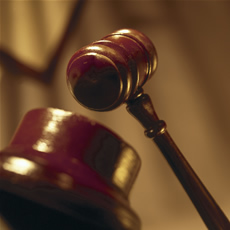
Of all the misguided schemes put forth lately to save newspapers (micropayments! blame Google!), the one put forth by Judge Richard Posner has to be the most jaw-dropping. He suggests that linking to copyrighted material should be outlawed.
No, Posner does not work for the Associated Press (which also has some strange ideas on linking). He is (normally) considered to be one of the great legal minds of our time. Posner is a United States Court of Appeals judge in Chicago and legal scholar who was once considered a potential Supreme Court nominee. He is someone who should know better. Yet in a blog post last week on the future of newspapers, he concludes there may be only one way to save the industry:
Expanding copyright law to bar online access to copyrighted materials without the copyright holder’s consent, or to bar linking to or paraphrasing copyrighted materials without the copyright holder’s consent . . .
Let me repeat that. He wants to “bar linking” to newspaper articles or any copyrighted material without the “copyright holder’s consent.” I am sorry Judge Posner, but I don’t need to ask your permission to link to your blog post or to a newspaper article online. That is just the way the Web works. If newspapers don’t like it, they don’t need to be on the Web.
Much of what Posner wants to outlaw is public discourse. Why is it okay for people to talk about the day’s news in a bar or barber shop, but not online? People should be able to discuss the day’s news on the Web without fear of violating copyright law. The natural way people discuss things on the Web is by quoting and linking to the source. (Except maybe Posner, he doesn’t seem to link to much of anything in his blog posts).
Posner never squares his position with freedom of speech or fair use rights. He doesn’t even mention them. Yet those are precisely the rights which allow me to paraphrase his argument without his permission so that I can disagree with it. Posner is more concerned with the “free rider” problem. You know, all of those “vampires” and “parasites” supposedly sucking the life out of newspapers by quoting from them or linking to their stories. Blogs and other sites just take content from newspapers, Posner asserts, but they share none of the costs of news gathering.
Of course, that blanket assertion is simply not true. A growing number of blogs, including TechCrunch, do their own news gathering and send writers to cover events at their own cost. But even if we limit the discussion to cut-and-paste sites, the free rider argument still doesn’t hold much water. You can’t be a free rider if you are giving something back of value. A link on its own is valuable.
Where does Judge Posner think all of these newspaper sites get their readers? It is mostly through links, not direct traffic. Removing the links would obliterate the majority of the online readership for many newspapers.
Beyond that, extending copyright law to criminalize linking would cripple the entire Web. In all of these debates, newspapers are always placed somehow at the center of the Web, completely ignoring the millions of other sites out there which have nothing to do with news. Yet changes to copyright law to make linking illegal would have much wider, unintended consequences. I can’t believe I even have to explain why this is a bad idea.
(Hat tip to Jay Rosen).